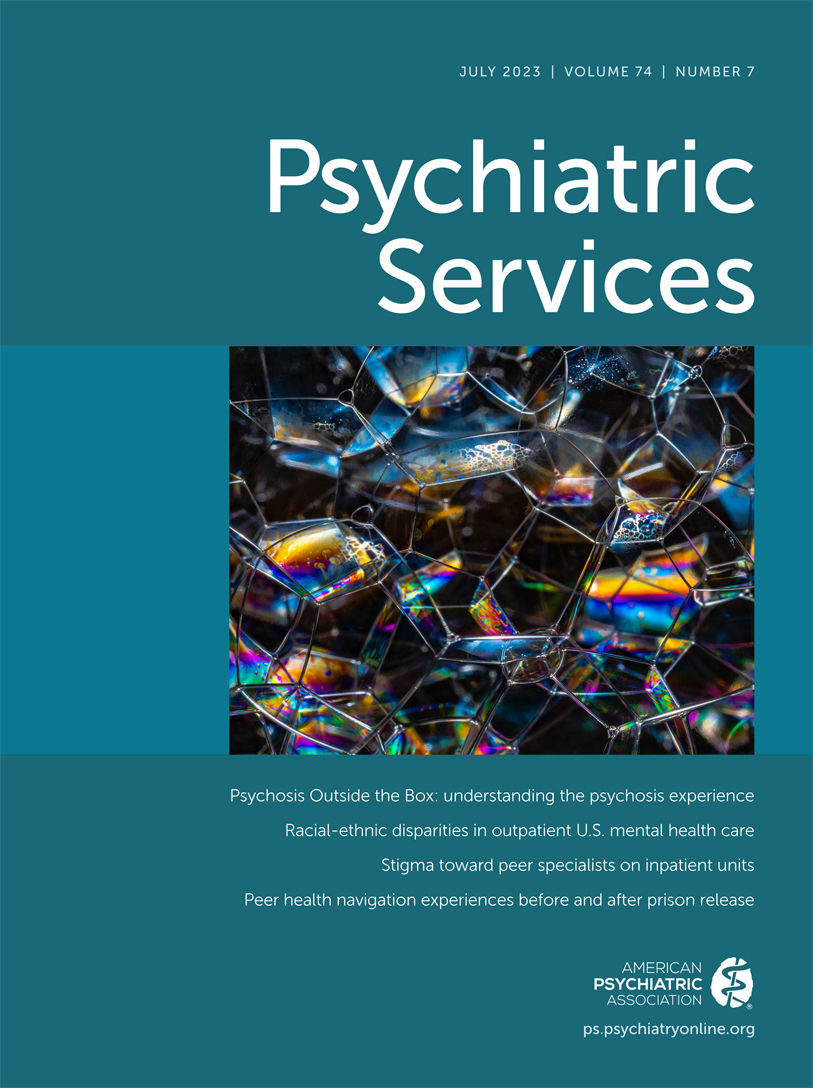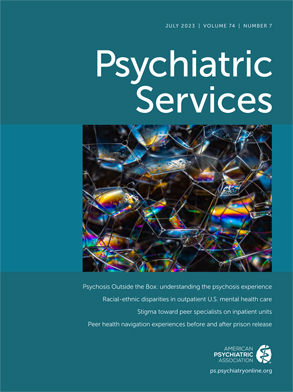This Editor’s Choice collection and others are available online in the Editor’s Choice section of ps.psychiatryonline.org.
The opioid epidemic in the United States is a public health crisis. Opioid overdoses have increased significantly in the last 20 years, quintupling since 1999. In the past 2 years (2021 and 2022), there have been over 100,000 deaths annually attributed to overdose in the United States; a majority (75%–80%) of these deaths involved opioids (
https://www.cdc.gov/nchs/nvss/vsrr/drug-overdose-data.htm). With the latest wave of opioid overdose deaths, most are now attributable to synthetic opioids, with a significant rise in illicit fentanyl use. San Francisco, for example, saw 625 deaths from overdose in 2021, 76% of which were related to fentanyl (
https://www.csuhsf.org/_files/ugd/91710f_af336537b8a04ca8a686f24444f9ee54.pdf). The harm of this public health crisis falls disproportionately on people of color, with over 300 of the 625 overdose deaths in San Francisco being among Black/African American individuals.
This month’s Editor’s Choice Collection highlights the public health response to this national crisis. Articles in this collection describe harm reduction policies, such as safe consumption sites and syringe access programs, models of low-barrier access to treatment, and the clinical challenges posed by fentanyl. They include a critical focus on the contribution of social determinants of health and racial and ethnic health disparities in the opioid epidemic.
Policy Considerations
Conceptualizing the COVID-19, Opioid Use, and Racism Syndemic and Its Associations With Traumatic Stress
Nguyen Hien D, Bauer AG, Franklin L, et al.
Psychiatr Serv 2022; 73:353–356
COVID-19 Could Change the Way We Respond to the Opioid Crisis—for the Better
Bao Y, Williams AR, Schackman BR
Psychiatr Serv 2020; 71:1214–1215
Fentanyl and the Evolving Opioid Epidemic: What Strategies Should Policy Makers Consider?
Barry CL
Psychiatr Serv 2018; 69:100–103
Establishing Sanctioned Safe Consumption Sites in the United States: Five Jurisdictions Moving the Policy Agenda Forward
Kennedy-Hendricks A, Bluestein J, Kral AH, et al.
Psychiatr Serv 2019; 70:294–301
Communication Strategies to Counter Stigma and Improve Mental Illness and Substance Use Disorder Policy
McGinty E, Pescosolido B, Kennedy-Hendricks A, et al.
Psychiatr Serv 2018; 69:136–146
Spillover of Medicaid Expansion to Prescribing of Opioid Use Disorder Medications in Medicare Part D
Abraham AJ, Lawler EC, Harris SJ, et al.
Psychiatr Serv 2022; 73:418–424
How Physician Workforce Shortages Are Hampering the Response to the Opioid Crisis
McNeely J, Schatz D, Olfson M, et al.
Psychiatr Serv 2022; 73:547–554
Rural-Urban Differences in Physician Bias Toward Patients With Opioid Use Disorder
Franz B, Dhanani LY, Miller WC
Psychiatr Serv 2021; 72:874–879
Adapting Service Models
Low-Barrier Buprenorphine Treatment for People Experiencing Homelessness
Gibson CL, Lo E
Psychiatr Serv 2023; 74:104
A Mobile Buprenorphine Treatment Program for Homeless Patients With Opioid Use Disorder
Buzza C, Elser A, Seal J
Psychiatr Serv 2019; 70:635–636
Clinical Interventions
Guidance for Handling the Increasing Prevalence of Drugs Adulterated or Laced With Fentanyl
Allen C, Arredondo C, Dunham R, et al.
Psychiatr Serv in Advance (April 12, 2023)
Moving Beyond the Medication or Psychosocial Treatment Dichotomy to Address the Opioid Epidemic
Stimmel MA, Smelson D, Finlay AK
Psychiatr Serv 2022; 73:1320–1321
Enhancing Use of Medications for Opioid Use Disorder Through External Coaching
Molfenter T, Kim H, Kim J-S, et al.
Psychiatr Serv 2023; 74:265–271
Use of Predictive Analytics to Identify Unhealthy Opioid Use and Guide Intervention
Valdes EG, Reist C, Aamar R, et al.
PS in Advance (Dec 22, 2022)
Opioid Use Disorder Among Clients of Community Mental Health Clinics: Prevalence, Characteristics, and Treatment Willingness
Ober AJ, Hunter SB, McCullough CM, et al.
Psychiatr Serv 2022; 73:271–279
Concurrent Opioid and Benzodiazepine Utilization Patterns and Predictors Among Community-Dwelling Adults in the United States
Vadiei N, Bhattacharjee S
Psychiatr Serv 2020; 71:1011–1019
Sex Differences in Comorbid Mental and Substance Use Disorders Among Primary Care Patients With Opioid Use Disorder
Braciszewski JM, Idu AE, Yarborough BJH, et al.
Psychiatr Serv 2022; 73:1330–1337

